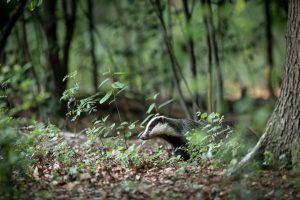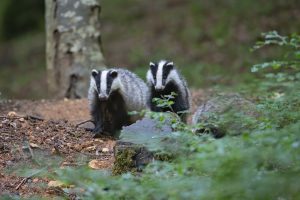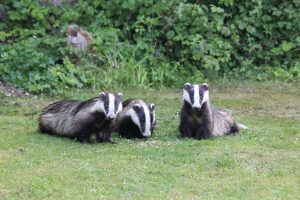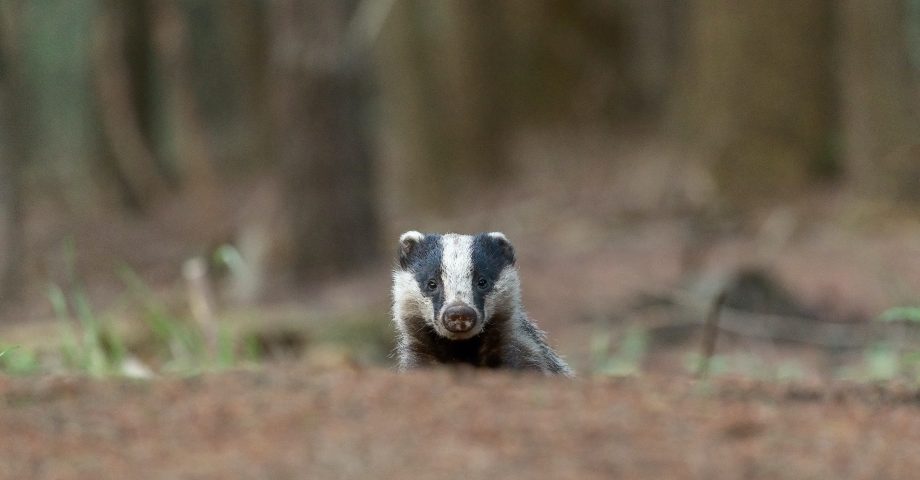Who doesn’t love badgers? These snuffling, exceptionally British beasts are icons of the European countryside. However, to many people, they’re quite misunderstood. Let’s take a look at a few fun facts about badgers to help clue you in on these marvellous mammals.
1. What are badgers, anyway?
Found in Europe, the Americas, Africa and Asia, badgers – as nocturnal animals – are seldom seen during the day!
2. They’re part of a large family!
Badgers are mammals listed in the family known as “mustelidae”. This includes European and American badgers, the honey badger, hog badger, and 3 types of ferret badger – including Calamanian, Indonesian, and Melogale. Phew!
3. What do badgers have in common?
Badgers range in size and weight according to species. Typically, all have dense fur coats, with black or dark brown and white stripes along their faces. They have pointed snouts and sharp claws with which to dig and hunt.

4. Badgers have curious dietary habits.
As omnivores, badgers adapt to eat what’s available and tasty in their environment.
This includes sweet berries, plant bulbs, lizards, earthworms, small birds and their eggs, and various rodents.
5. Wisconsin loves badgers!
Badgers were adopted as the representative animal of the state of Wisconsin, US.
6. Some badgers are more vulnerable than others.
The greater hog badger is ranked on the IUCN list as a “Vulnerable” species. This is due, sadly, to them being poached excessively.
7. What sets greater hog badgers apart from other species?
The greater hog badger has an average weight of 20 lbs and measures approximately 27 inches. It’s easily identified by its especially long elongated snout. They’re typically found in South East Asia.
8. Do badgers have any predators?
Aside from humans, badger predators include lions, hyenas, bears, bobcats, and wolves.
9. The honey badger is a tough cookie!
The honey badger has impressive immunity to the venom of many scorpions and snakes’ bites. That’s partly why they’re so aggressive – they can put up a good fight!

10. Badgers are seen as unwanted predators in some territories.
In the UK, badgers are regarded as the most numerous and largest of the predators on land. This is why a culling trend began – to protect other species and some parcels of land. Widespread Badger culling became an unpleasant norm in the UK some years ago.
11. Badgers are great at swimming!
Though able to swim, it is thought badgers only do so when they absolutely have to. They have muscular legs and strong feet for paddling.
12. The dachshund – mortal enemy of the badger?
Several types of dogs hunt badgers, but dachshunds were specifically bred for the purpose. Short in stature, they can find their way through tunnels badgers forge by digging with strong paws. Dachshunds, with sleek, short coats, slide through the earth. They can also swim well!

13. Badgers can live to a ripe old age!
Badgers can live for up to an impressive 24 years – that’s a life well spent digging and foraging.
14. Badger senses are odd to say the least!
Badgers have excellent hearing, which is undoubtedly part of their fantastic self-defence mechanism – as well as helpful in helping alert them to a source of food. They have an equally good sense of taste!
However, as nocturnal animals, badgers have weak eyesight and rely on their other senses to locate their setts, food, offspring, and mates.
15. What does the badger say?
Badgers make approximately 20 different sounds within the range of a series of purrs, squeaks, coos, growls, and shrill calls.

FAQs about Badgers
Do badgers hibernate?
Unlike many wild mammals who sleep in dens, badgers do not hibernate in the true sense. They sleep for several days, perhaps weeks, during the worst winter weather..
Do any countries eat badger meat?
People in Russia, Italy and some Asian countries eat badger meat, as well as in some parts of the USA, and as a rarity in the UK.
Do badgers bite humans?
It’s rare that badgers will bite you unless they feel threatened - so treat them with respect and you’ll be fine!
Further reading
https://www.badgertrust.org.uk/badgers
https://www.mammal.org.uk/species-hub/full-species-hub/discover-mammals/species-badger/
Do you know any fun facts about badgers? Share them in the comments below!










